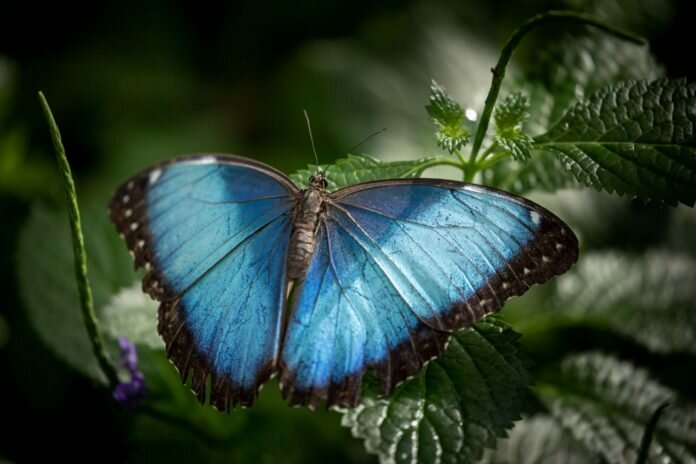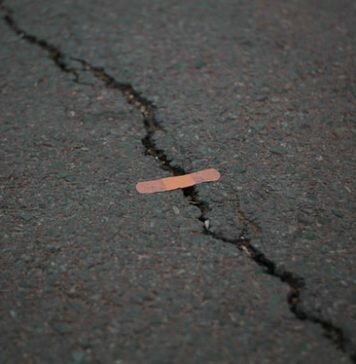It is January 2021, ten months into a global pandemic that has claimed the lives of over 400,000 people, shuttered my in-person MFA program, and sequestered me at home with mountains of work. The only in-person interactions I have now are with the teenagers I coach early each morning, yelling at them to social distance in the pool and wear their masks as soon as they climb out.
Tonight, memories play across the ceiling, fueled by insomnia, sometime between two and three in the morning, an hour before my alarm will go off for work. The skin on my arms burns, aches—begging me to get up, to walk across my apartment to the kitchen, to find the small paring knife that has become my favorite when I cook, for its handle that fits perfectly in my hand. I imagine pressing it against my arm—the untattooed one—until tiny lines of blood appear. In my mind, it doesn’t hurt so much as relieve—turning physical the pain aching deep in my chest, my stomach, my pelvis.
Curling on my side, comforter bundled to my chest, I don’t move further. Beside me, my boyfriend snores softly, peacefully oblivious.
***
Six years previous, almost to the day, my mom first noticed the tiny scratches on my wrist, peeking out between the cuff of my sweatshirt slipping down and the watchband that was supposed to cover them.
What are those, she asked, the same hard edge creeping into her voice she affected each time she noticed I’d been ripping out my eyelashes again. I pulled my sweatshirt sleeve down, hit the gas when the light in front of us turned green.
They’re from throwing in lane lines this morning, I said. A convincing lie—she remembered the long red lines that stretched from shoulder to elbow when I would stumble out of the pool after morning practice. The old plastic would break off the buoys, leaving sharp edges behind that dug in each time I careened into the lane lines I couldn’t see. It wasn’t hard for her to believe they came from swapping the pool from long course to short course this morning.
While I followed her around Target, I texted my then-boyfriend, a man three years older than me. We’d been dating eight months, in which time he’d already shown his penchant for manipulation, emotional and sexual abuse.
My memories are foggy—I couldn’t tell you how many times he’d assaulted me by then. I remember flashes. More pointedly, I remember the numbness—how I would freeze, stiff and unmoving, when his hands slipped under my shirt without asking. How I would stare at the ceiling, detached from my body, when his fingers worked their way into my underwear despite my repeated protests. I remember the ache that came in the aftermath of his insistence. Inside me, where his nails scratched and pushed, but in my chest, too. I swore I could feel pieces of myself breaking.
My mom saw these scratches on my wrist, I texted him. Hitting send before I could delete the words.
Did you make them?
Biting my lip, I typed, Yes.
He didn’t respond.
***
One night, I am washing knives after cooking dinner. I coat the blade in soap, running it back and forth between my fingers before replacing it under hot water. Without thinking, I close the blade in my right hand, anticipating the bite of pain. I pull back before the edge can cut. Drop the knife in the sink with a clatter. Turn off the water and stare.
***
I don’t remember when I started cutting, whether it was October 2014, after my then-boyfriend shoved his fingers inside me for the first time one morning after my biology lab. I don’t remember if it was in November of that year, after he stared me down throughout a party where I huddled in the corner of my best friend’s couch. I didn’t speak or move until one of my oldest friends arrived, when I launched myself from my seat and into his arms. He spun me around in the middle of the room, laughing. In the car on the way home, my then-boyfriend berated me, demanding I tell him I loved him (I hadn’t since October, since the assaults; I’d shut down emotionally and physically). When I couldn’t get the words out, and then when all I could spit out between sobs was I do, I do, I do, he grew cold, hard, staring straight ahead at the winding neighborhood road, his skin sallow under the glow of each passing streetlight. We sat in his locked car in my driveway for forty-five minutes while I begged, pleaded, for him to believe me.
Was it that night? Or the following, after almost twenty-four hours of refusing to speak to me, when he texted me demanding I call him. I’m at work, I responded, throwing my phone into my bag.
Call me as soon as you get home, read the message I didn’t receive until I got off work.
I did. He didn’t allow space for conversation. I want to break up, he insisted. We had been together six months and a day.
I asked why. I asked if we could talk about this, in person, the following day. If he could tell me, to my face, he didn’t want to be with me anymore.
Was that the first night I cut, sometime after I turned my phone off and flung it across the room? Sometime between sobs I stifled with a pillow and dragging myself out of bed after no sleep to cry into my goggles for two hours during swim practice?
Or was it later? In December sometime? Perhaps shortly after Christmas? Or was it January? Were those first cuts my mom saw the first ones?
***
I remember what I first used—thumbtacks, because the tiny scratches didn’t really bleed. The pain aching deep in my chest was suffocating. I was lucky if I slept two or three hours between vague nightmares and my alarm going off for morning swim practice. I kept the thumbtacks on my nightstand, in a plastic container. It was easy enough to find one sharp enough, easy enough to dig it into thin skin, to breathe when the weight in my chest had a tangible counterpart.
But my brain—running wild with anxiety—panicked over bacteria, possible infection, so I turned to sewing needles—more easily sterilized with rubbing alcohol—the same ones I used for cross-stich, the same ones I used to make my then-boyfriend’s Christmas present, cross-stitched cartoon versions of ourselves holding hands, I love you stitched into the canvas to the side.
When did I switch to razor blades? Sometime later—when the abuse worsened, when he moved from fingering me without my consent to begging me for hand jobs, for blow jobs, for anything more no matter how many times I said no.
Like so many other things, I can’t remember. It’s buried in the fog that remains after dissociating so many times, the fog memories still surface from, unbidden.
I do remember trying to break the plastic razors I shaved with. Taking tweezers and trying to pry the blades out. Desperation rising, until I gave up, got in the shower, and sliced shallow cuts into the meat of my forearm under the sting of the hot water. The blood washed away quickly, swirls of pink disappearing down the drain by my feet.
When I got out, I rubbed Neosporin into my skin, put a Band-Aid or two over the clusters of three and four little red lines. I wore sweatshirts or cut closer to my wrist, when I could hide the Band-Aids under my watch band. It was easy enough.
***
When I swam, no one noticed. My coach, my teammates—everyone was consumed with their own lives. We got to the pool each morning, pulled our caps on, dove in. Swam for two hours and barely spoke. Swapped the lane lines. Pulled our clothes on and left. Our problems checked at the door, my coach liked to say.
When my then-boyfriend saw the cuts—the first time, and every time after—he said nothing. Each time he pulled my shirt off, my bra, my pants, whether I wanted him to or not, each time those cuts and the faint silvery scars they left behind were on full display, he said nothing. He didn’t tell me to stop, didn’t tell me he understood depression or self-harm—though he did, I knew he did—didn’t tell me I was destroying myself. So consumed with fixing me in other ways—in molding me into the image of perfection he told everyone I was, smart, athletic, capable of so much—he couldn’t stand to confront how quickly I was crumbling.
He just pressed his mouth so hard against mine my lips bruised. He ran his hands up and down my bare skin until it was chafed, raw. He tried to shove his fingers between my clamped legs, only giving up when I wouldn’t move. Resigned, he offered his penis, settling for a hand job I didn’t want to give, while I stared at the ceiling, wishing it would be over quickly.
***
I cut in cycles—several times, several days in a row, maybe for a few weeks or a month or two. Then I would stop. I would make it weeks, sometimes as long as three months, proud of myself and my commitment, before the desperation reached a breaking point. This continued for the three years we dated, while I tried to cling to a national-level swimming career I’d walked away from a swimming scholarship to chase, while I tried to maintain a 4.0 GPA, while I slept two or three fitful hours a night and dragged myself through practices at the backs of lanes I should have been leading.
I tried antidepressants—they made me suicidal, intent on using knives instead of razors, on acting instead of fantasizing—and therapy—I spent many hours in silence with the man I saw at the time, unsure how to explain the things churning inside my brain, the things my then-boyfriend did to me, sometimes minutes before I drove to his office—until I gave both up alongside competitive swimming.
Except—none of those granted the reprieve I needed. I cut again, just three months later, not long before I went to visit my sister in the hospital. I kept the sleeves of my oversized sweater pulled down over my hands, thinking—what? That an exhausted high-risk maternity ward nurse was going to notice some ragged, shallow cuts made from the blade of dull scissors? That anyone else had the capacity to care, when no one had bothered to before?
***
Later, I mapped it out. The times I cut matched when my then-boyfriend’s abuse reached its peaks. The breaks I took coincided with the honeymoon periods, those times when he would be kinder, when our relationship seemed bearable, successful, even. Seeing the two side-by-side, the pieces I could make sense of started falling into place.
The gaps stood out starkly.
***
The last time is burned into my memory: July 27, 2017. I spent the summer coaching for a local community swim club, an eight-week gig that barely paid enough to cover my car insurance and the gas required to drive to practices and meets. We had three days left in our season, and as team tradition mandated, we—coaches and all swimmers over thirteen—spent our balmy Thursday evening trekking from one neighborhood house to the next for each course of a dinner prepared and donated by the members of the club.
These progressive dinners were common in the wealthier neighborhoods of Fairfax County. I’d never done one on my own swim team growing up—half our kids didn’t even live in the neighborhood, but joined that pool because they attended the Spanish immersion magnet program at the local elementary school. My feet ached in unsupportive flats as we walked in a group from the first house to the second. I already couldn’t remember which road we started on, where I parked my car.
At the second house, where the main course would be served, I waited in line with one of my eighteen-year-old seniors, and one of my fellow coaches. A boy stood in line behind us, eavesdropping. The boy was seventeen, a talented swimmer with a mean streak, especially with women. I’d tried to avoid him all summer, tried to let the team representatives deal with him—adults he would be more likely to respect. He certainly didn’t see me, twenty-one, awkward in my sense of authority, as a real adult.
The boy had threatened me once earlier in the summer—he’d said he was going to hit me over the back of the head and shove me in the deep end of the pool so he could watch me drown. He’d said this so casually, with such a cold look in his eyes, that I’d slipped away to the other end of the pool for the rest of the meet. I didn’t celebrate when our team won. I started pulling out lane lines, taking down the backstroke flags, sticking to the sides of the parent volunteers. He wouldn’t pull anything with people watching, I thought. And he didn’t.
But at the progressive dinner, I watched my eighteen-year-old swimmers eyes grow wide mid-conversation. She clutched my arm, pulled me along toward the food. While we scooped lasagna on our plates, she said, he was doing this behind you.
And she demonstrated, contorting her hands as if strangling someone. Pantomiming throwing a person down on the ground. Gyrating her hips as if—
Having sex.
My brain spun. No—not quite—
Raping someone.
The boy had chosen a seat directly across from me at the long dining room table we were all seated at. The swimmer and I were last in line. There was nowhere else to sit, and the family hosting us—a kind family of Latter-Day Saints who had cooked and prepared so much for all of us—did not deserve my making a scene in the middle of their dining room. While I smiled at the boy, and the other coaches and swimmers beside me, and asked him about a meet he had coming up, I pictured running back to my car—the same car I couldn’t remember where I parked—and driving away.
I followed the kids and coaches to the last house for dessert, hanging far back behind them. Thunder rumbled in the distance, and fat raindrops were starting to fall when I finally reached the backyard patio my swimmers were lounging around, eating cake and brownies.
I sat at the bar under the deck, out of the rain, away from everyone else. I ate nothing, my stomach writhing, sour. The boy knew what he was doing—he’d threatened me before, had threatened my swimmers before. But who would believe me? The other coaches—all men—would say that was just who the boy was. The team representatives would say the season was over in three days. That it didn’t matter. I’d already decided I wouldn’t be returning the next summer.
What the boy didn’t know was what he’d triggered. The ache deep inside. The repressed memory I couldn’t yet drum up—the second-to-last time my then-boyfriend raped me, just three weeks prior, a memory my brain repressed fully and immediately. My shoulders shook as I fought back tears. My eighteen-year-old swimmer murmured in my ear the whole time. I can’t remember what she said.
I made it back to my car. I cried the whole drive home. I don’t know how I made it home, but the drive reminded me of another—one I made two years beforehand, when I’d been coaching for my childhood pool, when we’d wrapped up a meet at the pool I now coached for. The men I’d worked with then had mocked me for yelling at the swimmers to be quiet during the start of each race. They’d done nothing to pick up after our 250 kids, leaving me to clean up candy wrappers and broken swim caps in the dark, alone.
I’d almost crashed my car that night, twice. I’d never wanted to die so strongly before. I cut that night, too. Carved into my arms from wrist to elbow with a sewing needle, just hours before I had to go to morning practice. My mom saw those cuts, too. I repeated the same lie about broken lane lines.
When I parked, I texted my then-boyfriend, told him what happened. That’s assault, was his response.
I know.
You have to tell someone, he said.
No one is going to care, I said, desperate to convey the panic building in my chest. How utterly alone I felt in that moment, with no one to turn to.
He told me that he couldn’t help me, if I wasn’t going to tell anyone. He said he couldn’t be bothered with this, he had to go to bed. I did, too. I had my last college final the following day, one I hadn’t spent enough time studying for.
Instead of sleeping, I took a sewing needle from my nightstand, and dug it into my skin until blood welled to the surface. I scraped lines from left to right, starting at my wrist and working my way down to my elbow, just like I had two years before.
I don’t remember if my then-boyfriend saw those the following day. They were calling for torrential rain. I wore long sleeves.
***
In the following weeks, I would tell one friend, then another, what he’d done to me. I would wake up from a nightmare—vicious, horrific—a vivid reliving of the second-to-last-time my then-boyfriend raped me. I woke up with my skin of fire, with my insides aching, my entire body hurting so badly I couldn’t move for an hour. Until I texted those friends. Until I told them, without mincing words, what he’d done. That I needed to get out.
I broke up with him that day. Rather, I told him, over text—the same thing I’d chewed him out for so many times, hiding behind his phone when we so clearly needed to have a real conversation—that I couldn’t do this anymore. I meant destroying myself. I meant these cycles, the turbulence of survivable highs and self-harm-inducing lows. I meant our relationship in its current form, though I knew it needed to be our relationship, period.
He said if that’s how I felt, we needed to break up. Unlike the countless times before now, when he’d back me into corners both physical and metaphorical, and threatened to break up with me because of some slight only he could perceive—I didn’t love him enough, usually—I let it end. I drove over to a friend’s house and spent the afternoon crying into one of her pillows. I didn’t trust myself to be alone.
***
I can’t cut, I told myself in the aftermath, when I drove back to his house twice to pick up things I’d left behind. I can’t cut, I repeated as I sat in my car after weekly sessions with my new therapist. I can’t cut, I pleaded with myself, when he would text me. We could still be friends, he promised me, after all, when I cried into my hands on his couch the first time I stopped by to get my things. I didn’t realize how triggering that would be.
I can’t cut, I told myself on my birthday. I’d managed without for two months and two days. I was going to see him that night, at a get-together some friends were throwing to celebrate. It would be casual. I could handle it, I told myself, my friends, my therapist.
I thought we’d eat pizza, talk causally, play some Magic: the Gathering and bicker over who should take which cards from the box of the new set we’d picked up. I wasn’t expecting him to leave after only forty-five minutes. I wasn’t expecting him to text our friends—not me, only them—and tell them to never contact him again, that we would all be better off without him. I wasn’t expecting to debate with them for an hour over whether to call the police, because I was terrified he might do something drastic—something like attempt to kill himself.
I can’t cut, I cried to myself later that night, when I was home and wrapped in my blankets and safe, my nails digging hard into my palms. I told myself I wouldn’t do this anymore.
***
A year and a few weeks later, I had a butterfly tattooed on my left arm, over the faded, nearly invisible scars. A butterfly, for the Butterfly Project, something I’d read about in high school. For the fat, ugly, misshapen butterflies I drew on my best friend’s arm when I learned she would cut herself. For all those times I told her they’d better still be there the following day, smiling their lopsided smiles, unmarred.
A black line art butterfly with one teal wing—teal, for sexual assault survivors.
***
Why now? Why is this all coming back to me nearly four years later?
Is it moving out on my own? The separation I feel from my family? I still see them regularly, part of my quarantine-bubble, some of the only social interaction I have. It’s not the same, though.
Is it the pandemic as a whole, the deeper isolation I feel without my graduate program, the disconnect from the friends I haven’t seen in nearly a year? Is it the lack of outlets, the limited time I can swim in rec centers with reduced capacity, the cold weather cutting my long walks short? The suffocating pressure of trying to write my thesis, balance three jobs and coursework while trying to find work post-graduation, the lack of support from faculty and staff without in-person classes? The unshakable sense I annoy every person I email to ask questions, including my advisor? That every time I speak, someone wants me to shut up, to disappear, that I should just fucking shut up?
Part of me craves to abandon my resolve, to find that little black-bladed paring knife and make the cuts I fantasize about. The thought of the pain doesn’t scare me, dulled by time and memory. This part tells me not to worry about my boyfriend asking about the bandage I would use to hide the cuts, about the scars I would hide with concealer until I covered them with another tattoo. It whispers how good it would be, to feel something tangible again.
Another part of me knows this is what my depression looks like. It knows this is how my anxiety and my post-traumatic stress manifest. That self-harm, like alcoholism, is an addiction. That in the midst of so much chaos, my body longs for the rush of endorphins it used to rely on to survive moments like these. That the path to staying clean is uneven, harrowing. When I curl in a ball in the early hours of the morning, succumbing to flashbacks of abuse that lock my limbs in place because it’s better than the alternative—than getting up and cutting, because cutting is the one thing I know will release the panic building inside me—I try to think instead of my swimmers, of what we’ll do at practice in a few short hours. I’ll take them to the deep end. They’ll tread water for two minutes, their heads bobbing above the smooth, blue surface. On my go, they’ll sink to the bottom, thirteen feet down, and push off again, kicking their way to the surface, to a gasp of air. They’ll make it look so easy.
Photo by Vincent Van Zalinge













